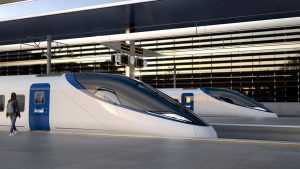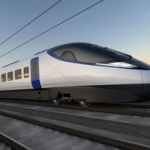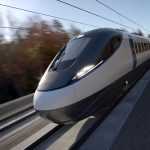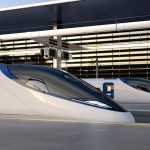 Hitachi-Alstom joint venture and HS2 Ltd have signed the contract design, build, and maintain the HS2 train fleet for the Phase One between London, the West Midlands and Crewe.
Hitachi-Alstom joint venture and HS2 Ltd have signed the contract design, build, and maintain the HS2 train fleet for the Phase One between London, the West Midlands and Crewe.
GBP 1.9 billion (EUR 2.2 billion) is the value of the contract under which 54 eight-car trains will be manufactured at the facilities in County Durham, Derby and Crewe. The contract includes an initial 12-year train maintenance contract which could be extended in the future to cover the estimated 35-year life of the rolling stock.
The first train is expected to roll off the production line in 2027 and following testing and commissioning process, the first passengers are expected to be carried between 2029 and 2033.
The vehicle body assembly and initial fit-out will be done at Hitachi Rail’s facility at Newton Aycliffe (County Durham) where a GBP 8.5 million (EUR 10 million) investment in new welding and painting facilities was completed. The second stage of fit out and testing will be done at Alstom’s Litchurch Lane factory in Derby. Under the contract, the two companies will create 2,500 jobs across the UK.
Capable of speeds of up to 360km/h, each train will be around 200m long with a capacity of 500 passengers and with the option to couple two units together a 400m long train can be created with up to 1,100 seats.
Passengers will be able to access seamless, high capacity wireless internet, digital seat reservations and richer travel information delivered through multiple channels, with the trains future-proofed to accommodate technological advances.
Train designers will work with world renowned inclusive design experts to put empathy at the heart of the design, meeting the needs of passengers of all ages and abilities.
The new trains “will transform rail travel offering passengers unparalleled levels of reliability, speed and comfort and help in the fight to remove carbon from our transport system,” HS2 Ltd Chief Executive Mark Thurston said.
The trains will be 15% lighter and offer 30% more seats than comparable high-speed trains in Europe, such as the Italian ETR1000 built by JV between Hitachi Rail and Alstom.
The lightweight and aerodynamic design, coupled with latest energy efficiency traction technology, ensures that the HS2 trains will be one of the world’s most energy efficient very high speed trains. The state of the art regenerative braking system improves energy efficiency even further by returning electricity back to the national grid.
The fleet will be maintained at a new maintenance depot being built at Washwood Heath on the outskirts of Birmingham, creating jobs and additional apprenticeship opportunities.
The trains will operate on the high-speed line between London and Birmingham as well as on the existing network to places such as Glasgow, Liverpool, Manchester and the North West.
The fully electric HS2 train fleet will have a major impact in reducing carbon emissions from transport by encouraging people away from fossil fuelled cars and planes, and onto rail.
Share on:






